Graduate
-
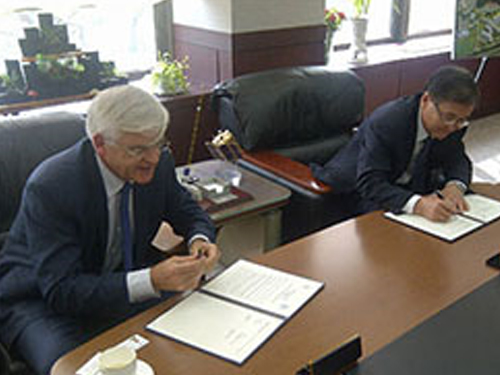 Partnership with École Centrale Paris
Courtesy of École Centrale Paris News: http://www.ecp.fr/lang/en/home/news?actuID=48892
Strengthening of the partnership betwenn CentraleSupélec and KAIST University, South Korea
The two institutions signed a new agreement.
Hervé Biausser (left in the picture), Director of CentraleSupélec, has met Sung-Mo Steve Kang (right in the picture), the President of the Korea Advanced Institute of Science and Technology (KAIST). They signed an agreement aiming to strengthen the partnership between the two institutions concerning research and higher education.
CentraleSupélec and KAIST have cooperated since 2010 on research projects in the context of the Erasmus Mundus BEAM and EASED programs, which are coordinated by CentraleSupélec.
The next step is now the application of graduate academic mobility in the common fields of excellency of the institutions: energy, electronic, physics and mathematics.
2015.11.02 View 6298
Partnership with École Centrale Paris
Courtesy of École Centrale Paris News: http://www.ecp.fr/lang/en/home/news?actuID=48892
Strengthening of the partnership betwenn CentraleSupélec and KAIST University, South Korea
The two institutions signed a new agreement.
Hervé Biausser (left in the picture), Director of CentraleSupélec, has met Sung-Mo Steve Kang (right in the picture), the President of the Korea Advanced Institute of Science and Technology (KAIST). They signed an agreement aiming to strengthen the partnership between the two institutions concerning research and higher education.
CentraleSupélec and KAIST have cooperated since 2010 on research projects in the context of the Erasmus Mundus BEAM and EASED programs, which are coordinated by CentraleSupélec.
The next step is now the application of graduate academic mobility in the common fields of excellency of the institutions: energy, electronic, physics and mathematics.
2015.11.02 View 6298 -
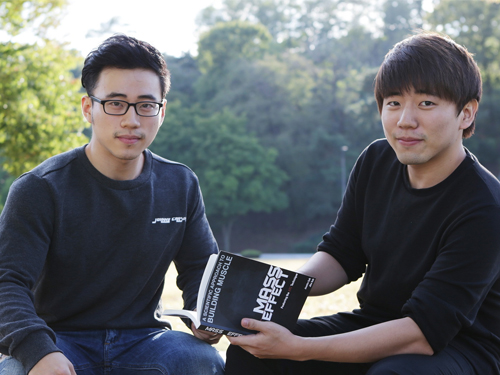 Two Undergraduate KAIST Students Publish a Book on Health Management
Joonho Suh of the Aerospace Engineering Department and Jiho Suh of the Mechanical Engineering Department are both brothers and undergraduates at KAIST.
The Suh brothers, who are three years apart, have recently published a self-help book in English on staying healthy entitled “A Scientific Approach to Building Muscle: Mass Effect.”
The book introduces techniques to build muscles, adapting them from an engineering concept called "Active Torque Control (ACT)," the management of turning forces imposed on a vehicle. Just as ACT influences the performance of a vehicle, good exercise involves the right degree of body angles and the right direction of body movements to keep the best posture necessary for burning calories and strengthening muscles.
In the book, they also suggest healthy diet plans based on scientific knowledge and data that the writers borrowed from such fields as anatomy, physiology, and motor mechanics to maintain a healthy weight.
Joonho Suh said,
“If we understand the mechanism of how our body works, the chances are high we will have good muscle tone and a balanced diet. We used a great deal of scientific knowledge and turned it into a health management program that can be customized per individual needs.”
The younger brother, Jiho, added,
“In fact, we applied our methods in the book to beginners who took weight training and fitness for one hour a day for one month, we learned that their muscle mass increased by 1-1.5 kg while losing body fat by 2-3 kg.”
The brothers said they planned to publish a Korean language version of the book next year.
The authors of "Mass Effect": Joonho Suh (left) and Jiho Suh (right)
2015.10.26 View 8201
Two Undergraduate KAIST Students Publish a Book on Health Management
Joonho Suh of the Aerospace Engineering Department and Jiho Suh of the Mechanical Engineering Department are both brothers and undergraduates at KAIST.
The Suh brothers, who are three years apart, have recently published a self-help book in English on staying healthy entitled “A Scientific Approach to Building Muscle: Mass Effect.”
The book introduces techniques to build muscles, adapting them from an engineering concept called "Active Torque Control (ACT)," the management of turning forces imposed on a vehicle. Just as ACT influences the performance of a vehicle, good exercise involves the right degree of body angles and the right direction of body movements to keep the best posture necessary for burning calories and strengthening muscles.
In the book, they also suggest healthy diet plans based on scientific knowledge and data that the writers borrowed from such fields as anatomy, physiology, and motor mechanics to maintain a healthy weight.
Joonho Suh said,
“If we understand the mechanism of how our body works, the chances are high we will have good muscle tone and a balanced diet. We used a great deal of scientific knowledge and turned it into a health management program that can be customized per individual needs.”
The younger brother, Jiho, added,
“In fact, we applied our methods in the book to beginners who took weight training and fitness for one hour a day for one month, we learned that their muscle mass increased by 1-1.5 kg while losing body fat by 2-3 kg.”
The brothers said they planned to publish a Korean language version of the book next year.
The authors of "Mass Effect": Joonho Suh (left) and Jiho Suh (right)
2015.10.26 View 8201 -
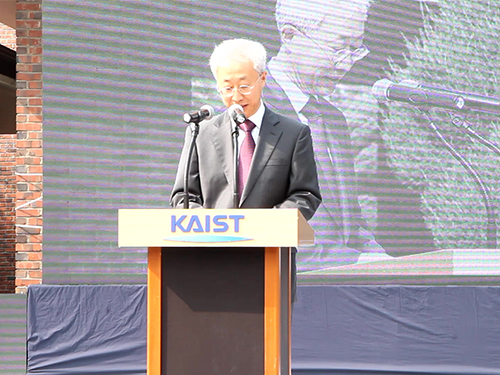 KAIST's Graduate School of Culture Technology Celebrates Its Tenth Anniversary
The Graduate School of Culture Technology (GSCT) at KAIST hosted a ceremony and a variety of events to celebrate its tenth anniversary on October 22, 2015, on campus.
Established in 2005 with the support of the Ministry of Culture, Sports and Tourism of the Republic of Korea, GSCT offers an intensive, in-depth education in culture technology, an interdisciplinary field first introduced in Korea by KAIST, which brings arts, humanities, science, and technology together in an academic and research arena.
Over the years, the graduate school has fostered top-notch researchers and professionals who have played a leading role in the development of a Korean culture contents industry that includes movies, broadcasting programs, music, games, and culture events.
After the anniversary ceremony, GSCT held a "Demo Day" to showcase its major research projects. A total of 41 projects were presented under the themes of “Art and Science,” “Human and Humane,” and “Virtual Reality vs Reality.”
In addition, there was a seminar held on GSTC’s ten-year accomplishment and future planning with the school’s Professors Sunghee Lee, Juyong Park, and Juhan Nam; a cultural event for the public called the “Talk Concert,” which included many professionals in culture industry and academia to share ideas and views; and the Homecoming Day for GSTC graduates. So far, the graduate school has produced 295 masters and 34 doctors. About 34% of its graduates are employed in the movie, game, and broadcasting sectors, 33% in the social networking service and Internet industry, and 33% in performing art and exhibition and event.
Dong-Man Lee, the Dean of KAIST's Graduate School of Culture Technology, said,
“We will continue to develop our school to lead the advancement of the Korean culture industry, contributing to the growth of Korean Wave, the popularity of Korean culture, in the global community.”
In the picture below, Dean Lee delivers a speech to celebrate the school’s tenth anniversary.
Soo-Man Lee, the founding chairman of S.M. Entertainment, speaks at the Talk Concert.
Scenes from the Demo Day
2015.10.26 View 8929
KAIST's Graduate School of Culture Technology Celebrates Its Tenth Anniversary
The Graduate School of Culture Technology (GSCT) at KAIST hosted a ceremony and a variety of events to celebrate its tenth anniversary on October 22, 2015, on campus.
Established in 2005 with the support of the Ministry of Culture, Sports and Tourism of the Republic of Korea, GSCT offers an intensive, in-depth education in culture technology, an interdisciplinary field first introduced in Korea by KAIST, which brings arts, humanities, science, and technology together in an academic and research arena.
Over the years, the graduate school has fostered top-notch researchers and professionals who have played a leading role in the development of a Korean culture contents industry that includes movies, broadcasting programs, music, games, and culture events.
After the anniversary ceremony, GSCT held a "Demo Day" to showcase its major research projects. A total of 41 projects were presented under the themes of “Art and Science,” “Human and Humane,” and “Virtual Reality vs Reality.”
In addition, there was a seminar held on GSTC’s ten-year accomplishment and future planning with the school’s Professors Sunghee Lee, Juyong Park, and Juhan Nam; a cultural event for the public called the “Talk Concert,” which included many professionals in culture industry and academia to share ideas and views; and the Homecoming Day for GSTC graduates. So far, the graduate school has produced 295 masters and 34 doctors. About 34% of its graduates are employed in the movie, game, and broadcasting sectors, 33% in the social networking service and Internet industry, and 33% in performing art and exhibition and event.
Dong-Man Lee, the Dean of KAIST's Graduate School of Culture Technology, said,
“We will continue to develop our school to lead the advancement of the Korean culture industry, contributing to the growth of Korean Wave, the popularity of Korean culture, in the global community.”
In the picture below, Dean Lee delivers a speech to celebrate the school’s tenth anniversary.
Soo-Man Lee, the founding chairman of S.M. Entertainment, speaks at the Talk Concert.
Scenes from the Demo Day
2015.10.26 View 8929 -
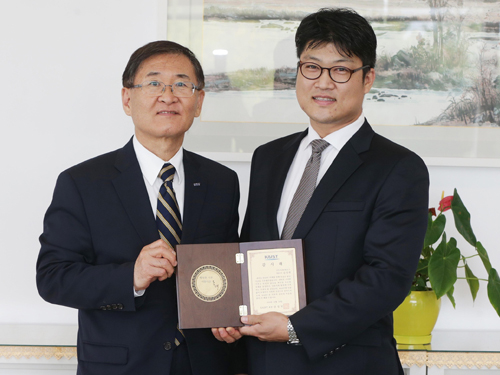 Epapyrus Donates KAIST Paperless Software
Epapyrus, a solution company for e-documents that was created by a KAIST graduate, donated USD 106,000 worth of paperless software to KAIST on October 20, 2015.
President Steve Kang of KAIST presented a plaque of appreciation to President Jung-Hee Kim of Epapyrus to recognize his donation.
To the Class of 2003 in computer science, President Kim said,
“KAIST has always been supportive of me. Even when I neglected my study to focus on the start-up of my company during college, the university encouraged me to pursue my dream. I was thrilled when I learned that KAIST was looking for an e-paper solution package because I knew I could return what I had received to my alma mater.”
President Kang replied,
“President Kim is indeed one of our proud alumni. He created a company based on an innovative idea, and we are pleased to see his company grow steadily. Certainly, we would not have accomplished all the great things without the generous support of our strong alumni.”
In the picture, President Steve Kang of KAIST (left) holds the appreciation plaque together with President Jung-Hee Kim of Epapyrus.
2015.10.23 View 3819
Epapyrus Donates KAIST Paperless Software
Epapyrus, a solution company for e-documents that was created by a KAIST graduate, donated USD 106,000 worth of paperless software to KAIST on October 20, 2015.
President Steve Kang of KAIST presented a plaque of appreciation to President Jung-Hee Kim of Epapyrus to recognize his donation.
To the Class of 2003 in computer science, President Kim said,
“KAIST has always been supportive of me. Even when I neglected my study to focus on the start-up of my company during college, the university encouraged me to pursue my dream. I was thrilled when I learned that KAIST was looking for an e-paper solution package because I knew I could return what I had received to my alma mater.”
President Kang replied,
“President Kim is indeed one of our proud alumni. He created a company based on an innovative idea, and we are pleased to see his company grow steadily. Certainly, we would not have accomplished all the great things without the generous support of our strong alumni.”
In the picture, President Steve Kang of KAIST (left) holds the appreciation plaque together with President Jung-Hee Kim of Epapyrus.
2015.10.23 View 3819 -
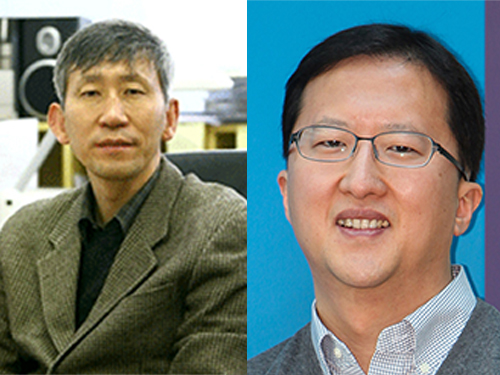 Professors Sukbok Chang and Jang-Wook Choi Receive the 2015 Knowledge Award from the Korean Government
The Ministry of Science, ICT and Future Planning (MISP) of the Republic of Korea announced the 2015 Knowledge Awards on October 20, 2015. Two KAIST professors received the award.
Established in 2009, the awards are presented to Korean scientists whose publications have contributed to the international science community. Specifically, the MISP used the two biggest science databases, Science Citation Index Expanded (SCIE) and Scopus, to identify ten highly cited papers ranked in the top 1% by total citations in the past ten years.
Professor Sukbok Chang of Chemistry (left in the picture below) is a global authority in the field of catalytic hydrocarbon functionalization. His paper entitled “Palladium-catalyzed C-H Functionalization of Pyridine N-Oxides: Highly Selective Alkenylation and Direct Arylation with Unactivated Arenes,” which was published in the Journal of the American Chemical Society in 2008, was once selected by Thomson Reuters as one of the “Most Influential Research Papers of the Month.” In 2011, the American Chemical Society included his paper in the list of the top 20 research papers that were most frequently cited in the last three years.
Professor Jang-Wook Choi of the Graduate School of EEWS (Energy, Environment, Water, and Sustainability) has been known for his leading research in rechargeable battery, supercapacitor, and materials chemistry. In particular, his work on secondary fuel cells attracted significant attention from academia and industry in Korea. Professor Choi developed a super-thin flexible lithium-ion battery this year, thinner than a credit card, which lasts longer than the existing batteries and with greater performance. He also developed new electrode materials for next-generation sodium-ion and magnesium secondary fuel cells.
Professor Sukbok Chang (left) and Professor Jang-Wook Choi (right)
2015.10.23 View 13170
Professors Sukbok Chang and Jang-Wook Choi Receive the 2015 Knowledge Award from the Korean Government
The Ministry of Science, ICT and Future Planning (MISP) of the Republic of Korea announced the 2015 Knowledge Awards on October 20, 2015. Two KAIST professors received the award.
Established in 2009, the awards are presented to Korean scientists whose publications have contributed to the international science community. Specifically, the MISP used the two biggest science databases, Science Citation Index Expanded (SCIE) and Scopus, to identify ten highly cited papers ranked in the top 1% by total citations in the past ten years.
Professor Sukbok Chang of Chemistry (left in the picture below) is a global authority in the field of catalytic hydrocarbon functionalization. His paper entitled “Palladium-catalyzed C-H Functionalization of Pyridine N-Oxides: Highly Selective Alkenylation and Direct Arylation with Unactivated Arenes,” which was published in the Journal of the American Chemical Society in 2008, was once selected by Thomson Reuters as one of the “Most Influential Research Papers of the Month.” In 2011, the American Chemical Society included his paper in the list of the top 20 research papers that were most frequently cited in the last three years.
Professor Jang-Wook Choi of the Graduate School of EEWS (Energy, Environment, Water, and Sustainability) has been known for his leading research in rechargeable battery, supercapacitor, and materials chemistry. In particular, his work on secondary fuel cells attracted significant attention from academia and industry in Korea. Professor Choi developed a super-thin flexible lithium-ion battery this year, thinner than a credit card, which lasts longer than the existing batteries and with greater performance. He also developed new electrode materials for next-generation sodium-ion and magnesium secondary fuel cells.
Professor Sukbok Chang (left) and Professor Jang-Wook Choi (right)
2015.10.23 View 13170 -
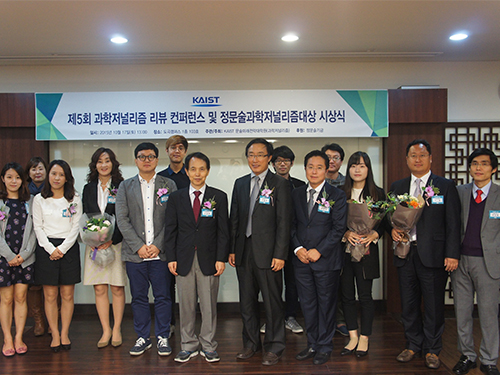 KAIST's Moon Soul Graduate School of Future Strategy Names Recipients of Science Journalism Awards
The Science Journalism Masters Program of the Moon Soul Graduate School of Future Strategy at KAIST named the winners of the 2015 Science Journalism Awards on October 17, 2015. The award ceremony took place at KAIST’s Seoul campus.
The awards were created in 2011 to recognize exemplary journalism that has contributed to the advancement of science and technology in Korea.
This year, the Korean Broadcasting System’s science show called the “Jang Yeong-Sil Show” received the Grand Prize. Yeong-Sil Jang was a Korean scientist and astronomer during the Joseon Dynasty in the 14th century.
A television documentary on challenges facing farm-raised chickens, which was produced by the Munhwa Broadcasting Corporation in Jeonju City, won the TV Award, while news coverage by Dong-A Daily on the outbreak of the Middle East respiratory Syndrome (MERS) in Korea received the Print Award.
After the award ceremony, students and professors of the Science Journalism Program hosted a conference to review and discuss major issues covered by the news media in the past year.
2015.10.15 View 7482
KAIST's Moon Soul Graduate School of Future Strategy Names Recipients of Science Journalism Awards
The Science Journalism Masters Program of the Moon Soul Graduate School of Future Strategy at KAIST named the winners of the 2015 Science Journalism Awards on October 17, 2015. The award ceremony took place at KAIST’s Seoul campus.
The awards were created in 2011 to recognize exemplary journalism that has contributed to the advancement of science and technology in Korea.
This year, the Korean Broadcasting System’s science show called the “Jang Yeong-Sil Show” received the Grand Prize. Yeong-Sil Jang was a Korean scientist and astronomer during the Joseon Dynasty in the 14th century.
A television documentary on challenges facing farm-raised chickens, which was produced by the Munhwa Broadcasting Corporation in Jeonju City, won the TV Award, while news coverage by Dong-A Daily on the outbreak of the Middle East respiratory Syndrome (MERS) in Korea received the Print Award.
After the award ceremony, students and professors of the Science Journalism Program hosted a conference to review and discuss major issues covered by the news media in the past year.
2015.10.15 View 7482 -
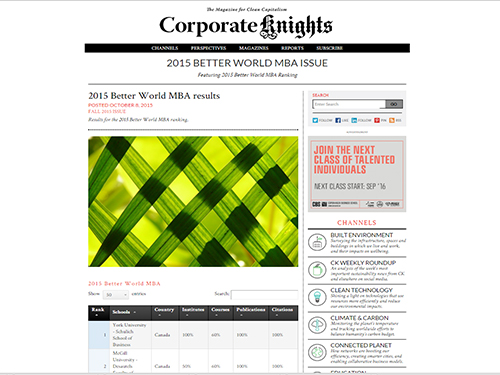 KAIST's College of Business Places Fourth in the 2015 Better World MBA Ranking
The Corporate Knights, a business and society magazine based in Canada, released the results of the 2015 Better World MBA Ranking on October 8, 2015.
KAIST’s business school ranked fourth globally and, number one in Asia, according to the list.
The 2015 Corporate Knights Better World MBA Ranking included a total of 121 schools; York University’s Schulich School of Business of Canada took first place.
The rankings were based on three criteria: the number of curricula (core and required courses) dedicated to sustainability, the number of research institutions and centers at the business school, and the volume of faculty research focused on better world topics such as sustainable finance, clean energy, or gender diversity.
The Better World MBA Ranking aims to identify business schools that best equip graduates who seek to change the world for the better by offering students opportunities to learn how to integrate social and environmental factors in their understanding of management functions via core MBA courses, faculty expertise, and research centers.
Dean Dong-Seok Kim of the College of Business at KAIST said,
“For years, our school has introduced a wide range of programs and research initiatives that address important social needs and issues. As part of this effort, we created the Graduate School of Green Growth and MBA for Social Entrepreneurship back in 2013. I believe that these endeavors played a favorable role in our receiving high scores in the ranking.”
KAIST’s Graduate School of Green Growth previously ranked sixth in the world’s top Green MBA School list published by Corporate Knights.
For the 2015 Better World MBA Ranking, go to
http://www.corporateknights.com/reports/2015-global-sustainable-mba/11153-14442629/.
2015.10.12 View 5816
KAIST's College of Business Places Fourth in the 2015 Better World MBA Ranking
The Corporate Knights, a business and society magazine based in Canada, released the results of the 2015 Better World MBA Ranking on October 8, 2015.
KAIST’s business school ranked fourth globally and, number one in Asia, according to the list.
The 2015 Corporate Knights Better World MBA Ranking included a total of 121 schools; York University’s Schulich School of Business of Canada took first place.
The rankings were based on three criteria: the number of curricula (core and required courses) dedicated to sustainability, the number of research institutions and centers at the business school, and the volume of faculty research focused on better world topics such as sustainable finance, clean energy, or gender diversity.
The Better World MBA Ranking aims to identify business schools that best equip graduates who seek to change the world for the better by offering students opportunities to learn how to integrate social and environmental factors in their understanding of management functions via core MBA courses, faculty expertise, and research centers.
Dean Dong-Seok Kim of the College of Business at KAIST said,
“For years, our school has introduced a wide range of programs and research initiatives that address important social needs and issues. As part of this effort, we created the Graduate School of Green Growth and MBA for Social Entrepreneurship back in 2013. I believe that these endeavors played a favorable role in our receiving high scores in the ranking.”
KAIST’s Graduate School of Green Growth previously ranked sixth in the world’s top Green MBA School list published by Corporate Knights.
For the 2015 Better World MBA Ranking, go to
http://www.corporateknights.com/reports/2015-global-sustainable-mba/11153-14442629/.
2015.10.12 View 5816 -
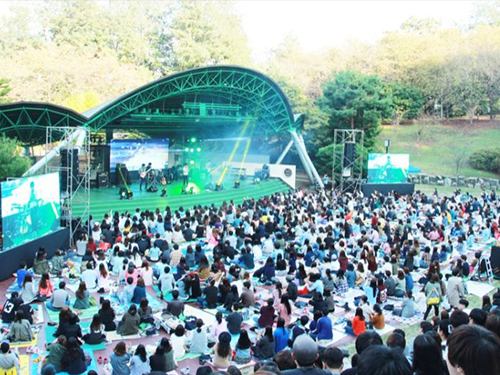 The 2015 Rock Festival on Campus
The Undergraduate Student Association of KAIST hosted a fall rock festival on campus on October 3-4, 2015. The festival, which began in 2011, included students and local citizens who enjoyed rock music, arts and crafts, independent films, and flea market.
President Kang-In Kim of the student association said,
“We are pleased to offer a place where KAIST students and the local community come together and have fun. We will try to continue this event in the future, making it a tradition of KAIST.”
2015.10.01 View 3248
The 2015 Rock Festival on Campus
The Undergraduate Student Association of KAIST hosted a fall rock festival on campus on October 3-4, 2015. The festival, which began in 2011, included students and local citizens who enjoyed rock music, arts and crafts, independent films, and flea market.
President Kang-In Kim of the student association said,
“We are pleased to offer a place where KAIST students and the local community come together and have fun. We will try to continue this event in the future, making it a tradition of KAIST.”
2015.10.01 View 3248 -
 KAIST and Oberthur Technologies Agree for Research and Development in Mobile Security
Professor Kwangjo Kim of the School of Computing at KAIST has signed a research and development (R&D) agreement with Marc Bertin, the Chief Technology Officer of Oberthur Technologies (OT), a French security solutions firm, on September 18, 2015 in Paris.
Under the agreement, KAIST and OT will conduct joint research on mobile security as well as implement an internship program for KAIST graduate students to work either at OT’s R&D center in Korea or in France.
OT has established a research center in Korea in July 2014, which was the fourth of its research centers in Asia.
Professor Kim said, “Our goal at KAIST is to cultivate top-level security experts in security technologies. By partnering with such a leader in security technologies as OT, we know that we will both help shape tomorrow’s security solution for the IoT (Internet of Things) space.”
In the picture, Professor Kwangjo Kim (left) shakes hands with Marc Bertin, the Chief Technology Officer of Oberthur Technologies (right), after the signing of a memorandum of understanding.
2015.09.24 View 8286
KAIST and Oberthur Technologies Agree for Research and Development in Mobile Security
Professor Kwangjo Kim of the School of Computing at KAIST has signed a research and development (R&D) agreement with Marc Bertin, the Chief Technology Officer of Oberthur Technologies (OT), a French security solutions firm, on September 18, 2015 in Paris.
Under the agreement, KAIST and OT will conduct joint research on mobile security as well as implement an internship program for KAIST graduate students to work either at OT’s R&D center in Korea or in France.
OT has established a research center in Korea in July 2014, which was the fourth of its research centers in Asia.
Professor Kim said, “Our goal at KAIST is to cultivate top-level security experts in security technologies. By partnering with such a leader in security technologies as OT, we know that we will both help shape tomorrow’s security solution for the IoT (Internet of Things) space.”
In the picture, Professor Kwangjo Kim (left) shakes hands with Marc Bertin, the Chief Technology Officer of Oberthur Technologies (right), after the signing of a memorandum of understanding.
2015.09.24 View 8286 -
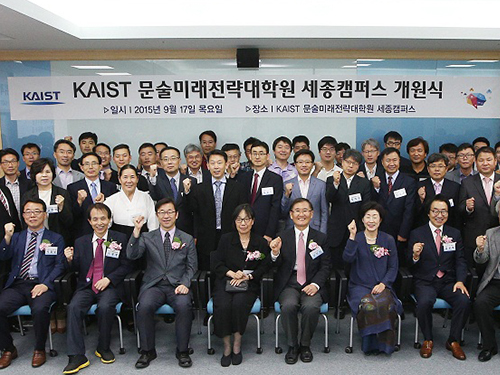 Moon Soul Graduate School of Future Strategy at KAIST Creates the Next Generation Open Forum 2045
Open forums for envisioning the next 30 years for Korea from the perspective of young people will be held in five metropolitan cities in Korea. Organized by KAIST and hosted by the Ministry of Science, ICT and Future Planning and the Committee for the 70th Anniversary of Korean Liberation, the Next Generation Open Forum 2045 invites young people to shape the future image of Korea for the upcoming 100th anniversary of Korean liberation. It will start off with its first event on September 22 in the Millennium Hall of Konkuk University in Seoul.
In this event, a panel and invited guests will discuss employment issues with a view to ameliorating problems prevalent in the society. A robotics scientist, Dr. JK Han will address the impact of robot automation on the job issue as a keynote speaker, and a performance featuring human-size robot actor will follow his talk to celebrate the opening of the event.
Invited guests can actively participate in the discussion by suggesting their opinions on job issue of the future and by voting on their smartphone apps during the event. Every opinion conveyed during the discussion will be printed and put in a time capsule, which will be opened in 2045 for the celebration of 100th anniversary of Korean liberation.
The Moon Soul Graduate School of Future Strategy of KAIST will organize events in five cities including Daegu, Daejeon, Busan, and Gwangju with topics including education, science and technology, unification diplomacy, and culture. The event will end with a symposium held in Seoul. Perspective applicants can apply for free to the Next Generation Open Forum 2045 on the official website of the Committee for the 70th Anniversary of Korean Liberation.
2015.09.22 View 5468
Moon Soul Graduate School of Future Strategy at KAIST Creates the Next Generation Open Forum 2045
Open forums for envisioning the next 30 years for Korea from the perspective of young people will be held in five metropolitan cities in Korea. Organized by KAIST and hosted by the Ministry of Science, ICT and Future Planning and the Committee for the 70th Anniversary of Korean Liberation, the Next Generation Open Forum 2045 invites young people to shape the future image of Korea for the upcoming 100th anniversary of Korean liberation. It will start off with its first event on September 22 in the Millennium Hall of Konkuk University in Seoul.
In this event, a panel and invited guests will discuss employment issues with a view to ameliorating problems prevalent in the society. A robotics scientist, Dr. JK Han will address the impact of robot automation on the job issue as a keynote speaker, and a performance featuring human-size robot actor will follow his talk to celebrate the opening of the event.
Invited guests can actively participate in the discussion by suggesting their opinions on job issue of the future and by voting on their smartphone apps during the event. Every opinion conveyed during the discussion will be printed and put in a time capsule, which will be opened in 2045 for the celebration of 100th anniversary of Korean liberation.
The Moon Soul Graduate School of Future Strategy of KAIST will organize events in five cities including Daegu, Daejeon, Busan, and Gwangju with topics including education, science and technology, unification diplomacy, and culture. The event will end with a symposium held in Seoul. Perspective applicants can apply for free to the Next Generation Open Forum 2045 on the official website of the Committee for the 70th Anniversary of Korean Liberation.
2015.09.22 View 5468 -
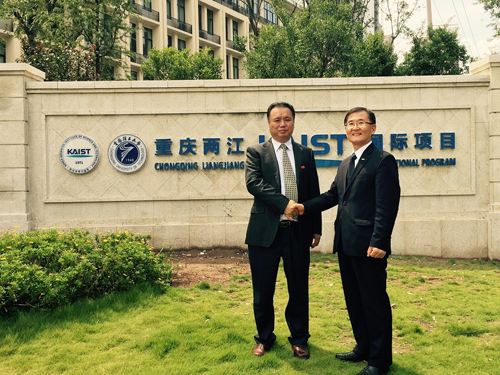 KAIST and Chongqing University of Technology in China Open an International Program
With the help of KAIST, Chongqing University of Technology (CQUT) in China established an electrical engineering and computer science program and admitted their first 66 freshmen this fall semester.
The joint program was created to foster skilled engineers in the fields of electrical engineering and computer science, which are necessary for the development of the Korean and Chinese Industrial Complex located in Chongqing City.
KAIST has provided CQUT with a majority of the program’s curricula currently offered to its students in Daejeon, Korea.
Under the jointly administered program, KAIST takes on education and research while CQUT is responsible for student selection and administration.
KAIST has dispatched eight professors to teach the related fields in English, and 17 CQUT professors will teach the rest of the curricula.
In August 2014, KAIST and CQUT singed a cooperation agreement for education and research exchange and created the CQUT-KAIST Education Cooperation Center, which is headed by Professor Young-Nam Han of the Electrical Engineering Department at KAIST.
The two universities will expand their collaboration to include graduate programs by 2016.
In the picture below, President Steve Kang of KAIST (right) shakes hands with President Shi Xiaohui of Chongqing University of Technology (left).
2015.09.17 View 11635
KAIST and Chongqing University of Technology in China Open an International Program
With the help of KAIST, Chongqing University of Technology (CQUT) in China established an electrical engineering and computer science program and admitted their first 66 freshmen this fall semester.
The joint program was created to foster skilled engineers in the fields of electrical engineering and computer science, which are necessary for the development of the Korean and Chinese Industrial Complex located in Chongqing City.
KAIST has provided CQUT with a majority of the program’s curricula currently offered to its students in Daejeon, Korea.
Under the jointly administered program, KAIST takes on education and research while CQUT is responsible for student selection and administration.
KAIST has dispatched eight professors to teach the related fields in English, and 17 CQUT professors will teach the rest of the curricula.
In August 2014, KAIST and CQUT singed a cooperation agreement for education and research exchange and created the CQUT-KAIST Education Cooperation Center, which is headed by Professor Young-Nam Han of the Electrical Engineering Department at KAIST.
The two universities will expand their collaboration to include graduate programs by 2016.
In the picture below, President Steve Kang of KAIST (right) shakes hands with President Shi Xiaohui of Chongqing University of Technology (left).
2015.09.17 View 11635 -
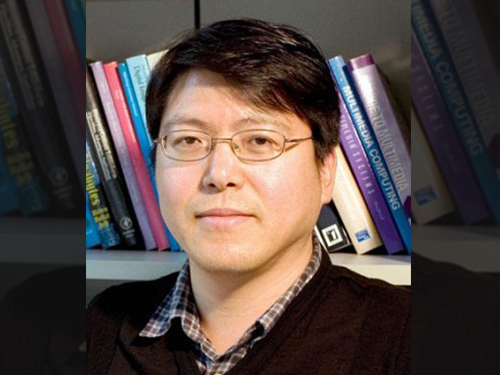 Professor Woontack Woo Demonstrates an Optical Platform Technology for Augmented Reality at Smart Cloud Show
Professor Woontack Woo of the Graduate School of Culture Technology at KAIST participated in the Smart Cloud Show, a technology exhibition, hosted by the university’s Augmented Human Research Center and presented the latest development of his research, an optical platform system for augmented reality.
This event took place on September 16-17, 2015 at Grand Seoul Nine Tree Convention Center in Seoul.
At the event, Professor Woo introduced a smart glass with an embedded augmented reality system, which permits remote collaboration between an avatar and the user’s hand.
The previous remote collaboration was difficult for ordinary users to employ because of its two-dimensional screen and complicated virtual reality system.
However, with the new technology, the camera attached to artificial reality (AR) glasses recognizes the user’s hand and tracks it down to collaborate. The avatar in the virtual space and the user’s hand interact in real space and time.
The key to this technology is the stable, real-time hand-tracking technique that allows the detection of the hand’s locations and the recognition of finger movements even in situations of self-occlusion.
Through this method, a user can touch and manipulate augmented contents as if they were real-life objects, thereby collaborating remotely with another user who is physically distant by linking his or her movements with an avatar.
If this technology is adopted widely, it may bring some economic benefits such as increased productivity due to lower costs for mobility and reduction in social overhead costs from the decrease in the need of traveling long distance.
Professor Woo said, “This technology will provide us with a greater opportunity for collaboration, not necessarily restricted to physical travelling, which can be widely used in the fields of medicine, education, entertainment, and tourism.”
Professor Woo plans to present his research results on hand-movement tracking and detection at the 12th International Conference on Ubiquitous Robots and Ambient Intelligence (URAI 2015), to be held on October 28-30, 2015, at Kintex in Goyang, Korea.
He will also present a research paper on remote collaboration at the ICAT-EGVE 2015 conference, the merger of the 25th International Conference on Artificial Reality and Telexistence (ICAT 2015) and the 20th Eurographics Symposium on Virtual Environments (EGVE 2015), which will take place on October 28-30, 2015 at the Kyoto International Community House, Kyoto, Japan.
2015.09.16 View 9978
Professor Woontack Woo Demonstrates an Optical Platform Technology for Augmented Reality at Smart Cloud Show
Professor Woontack Woo of the Graduate School of Culture Technology at KAIST participated in the Smart Cloud Show, a technology exhibition, hosted by the university’s Augmented Human Research Center and presented the latest development of his research, an optical platform system for augmented reality.
This event took place on September 16-17, 2015 at Grand Seoul Nine Tree Convention Center in Seoul.
At the event, Professor Woo introduced a smart glass with an embedded augmented reality system, which permits remote collaboration between an avatar and the user’s hand.
The previous remote collaboration was difficult for ordinary users to employ because of its two-dimensional screen and complicated virtual reality system.
However, with the new technology, the camera attached to artificial reality (AR) glasses recognizes the user’s hand and tracks it down to collaborate. The avatar in the virtual space and the user’s hand interact in real space and time.
The key to this technology is the stable, real-time hand-tracking technique that allows the detection of the hand’s locations and the recognition of finger movements even in situations of self-occlusion.
Through this method, a user can touch and manipulate augmented contents as if they were real-life objects, thereby collaborating remotely with another user who is physically distant by linking his or her movements with an avatar.
If this technology is adopted widely, it may bring some economic benefits such as increased productivity due to lower costs for mobility and reduction in social overhead costs from the decrease in the need of traveling long distance.
Professor Woo said, “This technology will provide us with a greater opportunity for collaboration, not necessarily restricted to physical travelling, which can be widely used in the fields of medicine, education, entertainment, and tourism.”
Professor Woo plans to present his research results on hand-movement tracking and detection at the 12th International Conference on Ubiquitous Robots and Ambient Intelligence (URAI 2015), to be held on October 28-30, 2015, at Kintex in Goyang, Korea.
He will also present a research paper on remote collaboration at the ICAT-EGVE 2015 conference, the merger of the 25th International Conference on Artificial Reality and Telexistence (ICAT 2015) and the 20th Eurographics Symposium on Virtual Environments (EGVE 2015), which will take place on October 28-30, 2015 at the Kyoto International Community House, Kyoto, Japan.
2015.09.16 View 9978